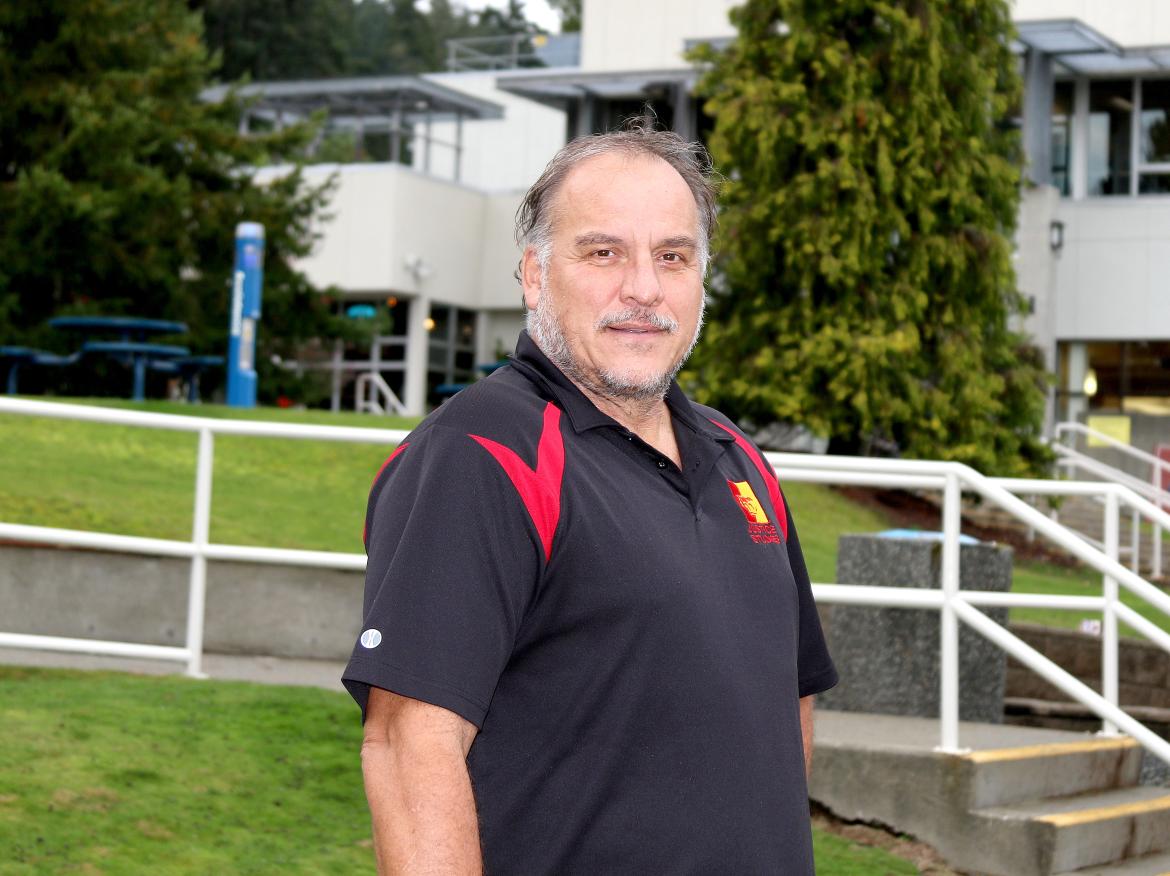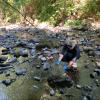
VIU’s inaugural Fulbright Canada Jarislowsky Visiting Research Chair in Aboriginal Studies, Dr. Roy Janisch, is excited to continue his restorative justice research where he enjoyed his sabbatical in 2014.
October 26, 2016 - 11:15am
VIU’s Reconciliation Road series fitting welcome as Fulbright Canada Jarislowsky Visiting Research Chair pursues research in restorative justice
Dr. Roy Janisch is on familiar ground as he strolls across Vancouver Island University’s (VIU) Nanaimo campus. The University’s Fulbright Canada Jarislowsky Visiting Research Chair in Aboriginal Studies was here in 2014 – on sabbatical from Pittsburg State University where he is a Justice Studies professor. He jumped at the opportunity to come back again to conduct collaborative research with VIU’s Departments of Criminology and First Nations Studies and to share his extensive knowledge of restorative justice.
Janisch, who is a Sisseton-Wahpeton Sioux Tribe member from South Dakota, began his term just as VIU launched a series of events under the banner of Reconciliation Road. The series is one way VIU is responding to the Truth and Reconciliation Commission of Canada’s calls to action, which included challenging educational institutions to lead the way in addressing reconciliation between Canada’s Indigenous and non-Indigenous peoples.
“Restorative justice is just one component of the many discussions going on at VIU right now, thanks to the Reconciliation Road series of events. Treaty issues, Indigenous law, residential schools, political identity and how these things were formalized are all being talked about,” said Janisch. “The efforts being done here to not only acknowledge the true history of this area but to actively seek healing and embrace traditional ways of knowing is admirable. I’m happy I’m here to witness it.”
In his role as the Fulbright Canada Jarislowsky Visiting Research Chair Janisch is examining the justice framework within which the Native American Tribe or Indigenous First Nation must work. He acknowledges it is difficult to change something that is so entrenched, but adds positive changes are taking place.
“Correctional staff have been empowered to invite Elders in to provide counselling to inmates and we are seeing Indigenous rituals and ceremonies being conducted in jails and correctional facilities across Canada and the US. The concept of restorative justice is becoming more mainstream but there is a lot of work to do,” he said.
Janisch, who spent many years serving as a police officer and criminal investigator on his home reservation, says longer term efforts must address the “front side” of restorative justice – strengthening education and schools, better and more culturally-relevant police training, building healthy communities, and providing help to the people who need it before they offend, or reoffend.
In 2014 Janisch contributed a chapter called Native American Incarceration: A Neglected Problem? to a book called ‘Punishment and Incarceration: A Global Perspective’. In it he points out that even though Native Americans are the smallest segment of the population, they are far overrepresented in the criminal justice system. In the chapter he examines law enforcement, courts and incarceration rates in conjunction with health disparities, human rights issues and chronic underfunding of Indigenous communities.
“In the US there are over two million people physically restrained in correctional facilities, operated by an industry that exists to warehouse people. This model doesn’t make sense,” said Janisch. “We can’t just keep throwing people in and expect different behaviour. The way it is currently set up almost guarantees Indigenous people, who are statistically overrepresented in this system, don’t have a voice. Restorative justice is an acknowledgement that there are circumstances where a different approach is necessary.”
The research chair position is supported by $250,000 USD in funding over five years which was provided by the Fulbright Canada Foundation and the Montreal-based Jarislowsky Foundation. During the 2016/2017 academic term Janisch will spend his time at VIU conducting research, delivering guest lectures, attending seminars and supporting ongoing restorative justice efforts.
He has also been taking part in a number of the Reconciliation Road events including being part of a Totem raising celebration and the opening ceremony of the nationally recognized Witness Blanket art installation, a wood based piece made up of hundreds of items reclaimed from residential schools and communities across Canada. Janisch says the impact and message these events send are profound.
“These events and the events yet to come in the Reconciliation Road series contribute to how we will find our way to new ways of doing and understanding. In terms of restorative justice, it’s by being a leader in these discussions that we can open up avenues of communication between individuals, groups, and communities. And from there I could see it grow to cities, provinces and the country.”
To learn more about Dr. Roy Janisch visit his webpage at Pittsburg State University.
For more information on VIU’s Reconciliation Road events which include an upcoming Indigenous Speakers Series, a rare solo performance by legendary Cree singer Buffy Sainte-Marie and a Testify project exploring Indigenous law issues go to Reconciliation Road.
-30-
MEDIA CONTACT:
Dane Gibson, Communications Officer, Vancouver Island University
P: 250.740.6288 | C: 250.618.7296 | E: Communications@viu.ca | T: @viunews
Tags: Research






